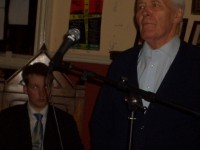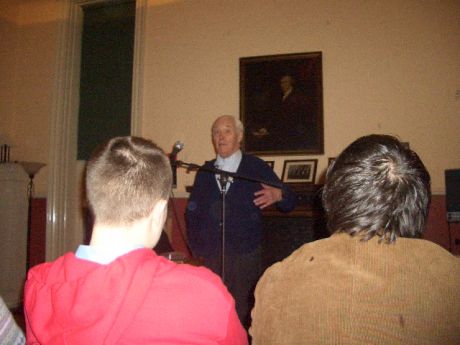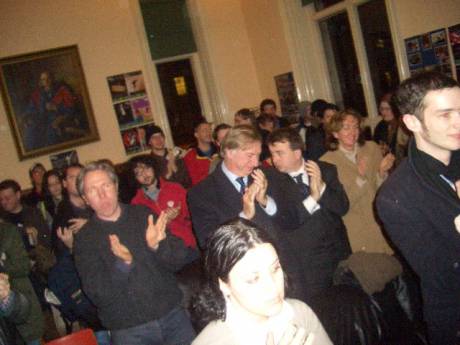Tony Benn, a Chomsky For Social Democrats, Kicks It Off In Dublin.
 dublin |
miscellaneous |
feature
dublin |
miscellaneous |
feature  Tuesday February 06, 2007 22:32
Tuesday February 06, 2007 22:32 by Pinhead - Gabber Shoplifters FC
by Pinhead - Gabber Shoplifters FC
A Report Of His Recent Address To The Trinity Hist
An Indymedia contributor stumbles out of their weekend lethargy long enough to dust off a hangover and type up this report on a Tony Benn address entitled "Peace, Faith and Power" delivered over two weeks ago on January 23rd to Trinity's Hist. With the dazzling might of the Internet age at my disposal, contemporaneous reporting has never been so exciting…
First the platitudes, Tony Benn is one of Britain's most graceful statesmen, serving over half a century in the British parliament before famously leaving to “devote more time to politics” and declaring himself "free at last" of the parliamentary shackles delaying real struggle.
While many of his generation of leftist politicians hold no interest in and add even less to today's movements Benn is remarkable in how many cling to him as an icon. He is well received at gatherings such as Glastonbury's Leftfield when voicing the concerns mobilizing those many decades younger than him.
Despite his popularity this Hist meeting took place on the quite with no posters around Trinity and an absolute silence among most left circles. But no surprise there - these sort of college meetings appeal to few outside those directly interested. They are mainly a play pen for society hacks to engage in a gymnastics of the intellect with all the prowess Richie Kavanagh displays musically. After I found my seat, two such sorts next to me lusted for controversy and filled each other in on the upcoming immigration debate featuring Aine Ni Chonail. "Is she a good looking woman?" One said to the other.
Arriving not exactly on time, Benn took to the podium with a clunky old cassette player and an IPod recording this speech as he does all of them. He opened up by loudly declaring that "the Irish cause is burnt into his heart" and how he once put up a plaque to Countess Markivicz as if to ingratiate himself to an audience who overwhelmingly come from a generation politically defined by anything but the North. He hoped the evening was to be a "discussion rather than of an academic character" and so did I, knowing that anything but an audience led discussion would mean Hist morons bravely defending the progress of history against Benn's foolhardy economy wrecking throwback-ism.
For Benn we are a generation with choices of "enormous magnitude" due to the accumulation of destructive technologies. We are also a generation with the capabilities of making such choices, due to the proliferation of information on the Internet. Later in the evening he described how the net enabled a degree of power transference from rulers, citing his knowledge of the American anti-war movement despite a mainstream media blackout here. When Jim Roche of the Irish Anti-war Movement questioned him on the tasks to be undertaken in rebuilding the global anti-war movement, he discouraged pessimism and described it as the biggest movement he has seen in his lifetime, largely again due to the Internet.
He insisted however that what was needed was a movement for the control of resources and that this should always be the aim of the peace movement. Aimlessly surfing details about Benn later left me with a bratish grin after all that "Internet good" lark his own site was down to be "completely redesigned to add new content during 2005."
Benn described how once there was a British empire but that it has now given way to the dominance of the American empire with the vision of Neo-con groups like The Project for a New American Century. In a constant theme he drew a parallel between the militarism of the west and terrorism describing how he was a terrorist in the British Home Guard as a teenager trained to kill. His speech was littered with a schoolboy cheek through out and he joked that "everyone we locked up as a terrorist ended up having tea with the Queen as a leader of Commonwealth countries."
With the theme of the evening being partially religious, he moved towards biblical themes relating how his mother told him the bible was a conflict between Kings and revolutionary prophets and it is this reading he has stuck with. He related an interesting moral poll to the audience that showed most British valued the commandment “treat others as you would like them to treat you” more than any other. Using no notes he constantly flitted between subjects, and expressed exasperation with the Israeli occupation of Palestine because he "didn't know god was an estate agent." In wars based on religion he sees no hope of settlement.
Humour is the source of much of Benn's charisma and he is a genuinely funny guy finding systemic ironies that hint at broader inequalities in the most mundane subjects. Benn can be considered something of a Noam Chomsky to social democrats, a prolific writer his arguments for a socialism coming from within the Labour Party are as pervasive among Labour Youth radicals as Chomksy-lite moments are in the writings of young anarchists. While Chomsky uses a relentless logic and scrutiny of sources to highlight dichotomies of interest, Benn simply pokes fun and relishes how they collapse under the weight of their own ludicrousness. For instance can you imagine if British Muslims were to sing a hymn similar to "Onwards Christian Soldiers?"
His recall of anecdote is essential to this rhetorical force. As a fervent critic of Stalinism he digs into his own experiences in the USSR to describe its tolerance of inequalities, he once asked a former USSR education minister about schools for gifted children under supposed socialism only to be told "but comrade they're really schools for the children of specially gifted adults!" These moments of light relief drawn from his contacts with power, are also sourced in those outside of power such as one woman who wrote to him in the late sixties asking "now that man has reached the moon was there any chance of a better bus service round her way?"
From reading some of his speeches Benn seems fond of drawing comparisons between today's Britain and Britain in the 19th Century, with Tories battling Whigs despite ideological confluence and no one representing the working masses. For Benn change is largely premised on the unions. In the same way that the Tolpoddle Martyrs and the movement that developed around them played a historic role in the struggle for democracy in the UK, movements today need to facilitate people in using the vote as a source of change. The Charterist struggle as Benn sees it was to "transfer power to the ballot, away from the market and the wallet."
However breathtakingly seconds later Benn undermined the force of his own argument for the vote as a fulcrum of change and argued that the UK is now "so utterly dependent" on the US that foreign policy is virtually excluded from being contestable through voting. Then of course as he sees it there is the committee level of the EU and WTO who seek to reduce the market to an "open playing field as if it were a game of cricket" in an effort to move power back from the ballot to the wallet. The "western democracies are all one party states - Cameron might even win the leadership of the Labour Party!"
Rulers need a controlling method and in Benn's analysis the present crop keep us frightened to demobilise us, and simultaneously demoralise us with things like league tables. In his eyes it is the very idea of leadership that needs to be challenged. For Benn the best kind of leadership is that when people say "we did it ourselves" as "all progress comes from the bottom up, from people outside the system." With these closing remarks he encouraged the audience to "do it themselves." To throw themselves into whatever it is that they are committed to, advising the use of his own five point Socratic plan for interrupting power with a set of questions: "What power do you have? Where did you get it? In whose interests do you rule? How accountable are you? How can we get rid of you?"
The first question fielded by Benn was that of socialists working within the Labour Party, he outlined how its never been socialist as a party but has always had socialists active within it. In his view the only option outside of it are the 57 varieties of Leninism. Despite his radicalism, Benn is clearly limited by a lack of vision when it comes to the process of political movements today. The root of this is a relentless belief in the Labour Party as an out growth of the working people historically and one that they must battle to push in a direction to their suiting. Any effort otherwise is simply reinventing the wheel.
A Socialist Workers' Party intervention (in their usual blend of rhetoric connecting weak movements here with mystified ones there) pointed to the development of a new left in South America, Germany and RESPECT in the UK. This contained a valid question of just how much democracy Benn thinks the system can deliver? Again there is little alternative Benn claimed, the arguments that come out of the fringe parties have an influence on the main parties, but that as a movement we should be generating a climate of opinion so strong leaders have no option but to act.
A female lecturer from Trinity asked a question about what academics are to do in the face of neo-liberal restructuring where management are turning universities into institutes of production rather than education? Benn joked again that he feels as if he is "mismanaged from parliament" and put forward his account of the Cuban health system where chair of the management committee is rotated among the various sectors involved the health provision. The issue of a Cuban democratic deficit prompted the question of how socialists should relate to state socialism there? He acknowledged that there is repression there but in a rhetorical flourish pointed to Gitmo as its main source, with Cuba's institutions warped due to economic embargo. "As a system it needs democracy to survive" he said.
Another academic sort asked if Britain is still a democracy due to gerrymandering? Benn quickly advocated proportional representation but was hesitant as to the effects of a list system in uprooting the geographical basis of politics. The questioner reiterated that his question was in relation to the North and Benn exclaimed, "that there is no Irish problem but a British problem in Ireland" and condemned collusion as it had emerged in then fresh reports. Next up was a question on how the opening of the market in China will affect the countries political system? Benn answered describing how there are already strikes occurring and that as in Britain the market will inevitably bring some degree of political freedom.
Throughout the evening Benn called for women to speak in that awkward way activists of an older generation grapple with gender dynamics at a meeting. This being the fifth or sixth time he had issued the call for "any women?" his voice held a glimmer of delight and he went "ah finally!" This joy suddenly dropped away as the female he hoped was standing to speak continued to the door and turned around to guffaws of realization that our young long hair was a rather red faced male student.
The meeting moved through this humorous moment along the theme of actually existing socialism, a questioner wondered had the absence of the USSR as "half completed revolution" and the "missed opportunities" for political revolution there in '56 and '67 set us back over a hundred years in socialist politics? Benn explained how there have only been two attempts at building socialism, firstly through an anti-democratic Stalinism and secondly in a social democracy that ended up advocating capitalism. Despite this bleak assessment, for the first time in Britain the general public are now well to the left of a Labour government". In the same vein when tackling the charge of an anti-Americanism that confuses criticism of state policy with chauvinism he claimed from the latest elections there "Americans are anti-American." Not for the first time Benn blamed a "left pessimism as the enemy of progress."
Somebody from Labour Youth asked how do we fight fascism today? Benn then described how it is something to be fought, as it is "worth fighting." Again he cast his mind back and recalled meeting Mosley as a child, years later he would meet Mosley this time wearing a black shirt and preying on the fears of workers during a depression to provide them with a scapegoat for the systems failings.
Another member of Labour Youth commented on how as Energy Minister Benn stopped the exploitation of North Sea rights being sold and asks what tactics can be used to fight the undemocratic nature of modern TNCs such as in the Rossport struggle? Benn says that these bodies, particularly in the oil industry are now bigger than nation states. He quiped that Churchill was the first to nationalize aspects of the oil industry in Britain and that his speech on this was something he'd relish reading to the Tories. It's important for good leadership on these issues with the capabilities to negotiate solid deals with control. I was surprised Benn didn’t instinctively name check more popular struggles over resources such as the Bolivian Gas Wars, movements involving mobilisation and participation as opposed to good, old solid social democratic leadership.
Much of Benn's analysis rides on using the vote and nation state as a tool for change, and he sees the challenges posed to sovereignty by globalisation as controllable through something along the lines of a European common wealth. When it comes to military intervention on humanitarian grounds, Benn describes the current UN Security Council as a historical accident and says he would support a proper police function in the UN.
The next questioner challenged much of the uncritical support given to Islamic resistance movements; he accused Benn of confusing what is largely a middle class and wealthy movement in his crude reading of terrorism as the "war of the poor against the rich." Benn simply replied that it's an anti-colonial struggle with Palestine at its root and there's no point denying these links.
A similar question arose later in the evening and pointed to failure in the anti-war movement to acknowledge political Islam as a deeply reactionary movement, describing the July bombings as "an attack on Britain from fascists within." Ben responded that he "heard reports of Islamic fascism but am I not in support of progressive imperialism," he saw the only solution as a peace conference to solve all of the Middle East. He then misread the original question to characterize it as similar to a desire to bomb South Africa in aid of the ANC and instead called for support for DIY liberation in Iraq.
Out of nowhere considering the nature of the discussion one of the usual suspects that hangs around these college functions arose and asked Benn what leader he admires the most? The answer is the rather obvious Gandhi first and then Bishop Tutu for the vision behind South Africa's Truth and Reconciliation process. Things were clearly on the wind down now but as Benn prepared to leave he let one more question in from a young man wearing traditional Muslim dress. The question was an attack on Benn for speaking on Islam at various stages of the night when he “knew nothing about it.” Visibly taken aback by this ambush from no-where, Ben denied anyone supreme knowledge and delighted in his ignorance as it rewarded him with life long learning. More retorts were directed at Benn and eventually the Hist bloke in a tin of fruit from previous question stepped forward in that ever so graceful mannered way they do to crowd out the Islamic guy. You can be almost certain he wouldn’t have intervened the way he did had the questioner been white.
As someone coming from a socialist tradition consisting of neither the 57 varieties of Leninism or a failed social democratic project, its no wonder I feel like I really share little in common with Benn. As a speechmaker he is superb and you could easily find yourself falling over in agreement with him. His radicalism is clearly voiced but he constantly by-passes it with his emphasis on opinion making in order to influence leaders through the vote. This illogically jars with most of his critique on the night, making it hard to swallow as a tactic for movements today.


